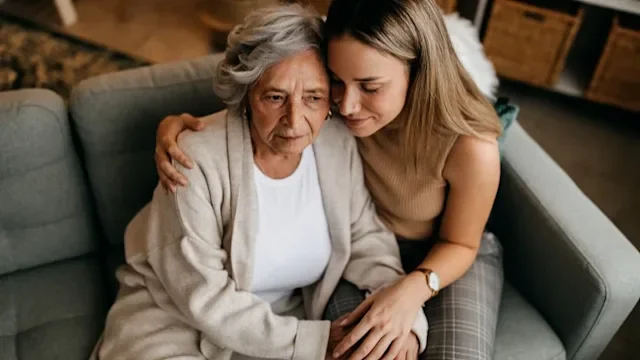Key takeaways:
Stress and burnout can negatively impact the physical and mental health of caregivers.
Joining a support group can help caregivers enhance their support system and reduce stress levels.
There are support groups available for caregivers of children, aging parents, and loved ones with disabilities or mental health conditions.
An estimated 53 million Americans provide unpaid care to a family member, a friend, or another adult. Care recipients range from children to older adults with mild to serious medical or mental health conditions, a disability, or a terminal illness.
While caregivers may find the work rewarding, many also become physically and mentally exhausted. That’s why support groups and other resources are vital for caregivers.
How to find a caregiver support group online or in person
You can start your caregiver support group search by talking to your healthcare provider, a mental health professional, or a local hospital, clinic, or community agency. They may know about support group meetings online or in your area.
You can also check out the organizations below to find groups for caregivers of children, aging adults, and individuals with disabilities or mental health conditions.
Support groups for caregivers of children
Support groups for caregivers of children are available for parents, grandparents, foster parents, and other family members and friends. Some groups focus on a specific condition or disability while others are devoted to causes like preventing child abuse. Some of these groups are held in person, others are held online, and some support services are even chat based.
Mommies of Miracles: This is a support network for parents of children (of any age) with rare and undiagnosed conditions, complex medical needs, or disabilities. The group has its own Facebook page where members can seek support from one another.
MOPS International: MOPS stands for Mothers of Preschoolers, but the international Christian faith-based organization also helps mothers of school-aged children. MOPS members have access to local groups and an annual conference called MOMCON.
Parents Anonymous: Parents Anonymous seeks to empower parents, children, and communities in a culturally responsive way. Trained facilitators run groups, which meet for 2 hours each week to teach skills aimed at strengthening families.
Program for Early Parent Support (PEPS): PEPS hosts support programs and groups for those seeking help with parenting issues. Groups are available in person and online for parents of children of all ages.
Postpartum Support International (PSI): PSI provides information for parents experiencing mood and anxiety disorders, like postpartum depression and anxiety. They also host online support groups. Groups are available for specific types of parents, including military parents, those who have lost a child, and parents who have a baby in the NICU.
Support groups for caregivers of older adults or parents
If you’re caring for an older parent or an adult with an illness or dementia, online and in-person support groups are available.
Alzheimer’s and Dementia Caregivers Support Chat Group: This Facebook group supports friends, family, and caregivers of loved ones with Alzheimer’s and other forms of dementia.
Caring for the Caregiver Support Group: This Facebook group offers emotional support to caregivers and their family members.
Dementia Caregivers Support Group: This group gathers on Facebook and focuses on caregivers for people with Alzheimer’s and other types of dementia.
Well Spouse Association: Well Spouse’s services include support groups, online chats and forums, respite weekends, and a program for caregivers of a disabled or ill spouse or partner. Support groups are offered online and in person in some areas.
Family Caregiver Alliance: This organization offers a range of online support groups for those caring for a loved one, as well as in-person groups in the San Francisco Bay Area. Their groups include a caregiver support group, an LGBTQ+ caregiver group, and a group for caregivers under 40 years old.
Daughterhood: Daughterhood is a community of women who are caring for an elderly parent. They offer online connection circles each week, where members can come together to share their experiences and receive support.
Alzheimer’s Foundation of America: In addition to education and resources, the Alzheimer’s Foundation of America offers weekly telephone support groups for caregivers of people with Alzheimer's.
American Stroke Association: The American Stroke Association provides information for caregivers on coping with a loved one’s stroke, as well as local support groups.
Parkinson’s Foundation: The Parkinson’s Foundation’s website includes extensive information for caregivers on Parkinson’s, managing caregiver burnout, and free courses. Local chapters also host support groups for those with Parkinson’s and their caregivers.
Support groups for caregivers of people with disabilities and mental health conditions
Many caregivers also provide care for someone with a disability or a mental illness. Support groups may help you find new resources and information, and offer you emotional support.
Association for Autism and Neurodiversity (AANE): AANE has online discussion forums and support groups for parents and families of children and adults on the autism spectrum.
Family Education and Resource Center (FERC): This California-based organization offers online support groups for caregivers of people with a mental illness in Alameda County.
National Alliance on Mental Illness (NAMI): NAMI offers family support groups and other resources for caregivers of those living with mental health conditions. Groups are held virtually and in person by local NAMI chapters.
Depression and Bipolar Support Alliance (DBSA): DBSA provides information and support for people living with depression and bipolar disorder and their caregivers. Online support groups for family, friends, and caregivers of people with mood disorders are also available.
National Eating Disorders Association (NEDA): NEDA is an organization that spreads information and awareness on eating disorders. They also collaborate with local chapters to offer support groups for people with eating disorders and their loved ones.
Partnership to End Addiction: Parents of a child struggling with a substance use disorder can visit Partnership to End Addiction’s parent and family support groups and resources.
Children and Adults with Attention-Deficit/Hyperactivity Disorder (CHADD): CHADD seeks to improve the lives of all people living with ADHD. In addition to valuable information on supporting a child with ADHD, they have an online community for parents and caregivers.
Read more like this
Explore these related articles, suggested for readers like you.
How can you prepare for your first meeting with a support group?
Support groups typically welcome visitors and new members with open arms. They offer safe spaces to talk about your challenges, seek support, and remind you that you’re not alone.
As you prepare for your first meeting, here are some tips:
Feel free to share as much (or as little) as you want about your situation. There are no requirements to share; do what makes you feel comfortable.
If you have questions, jot them down ahead of time and bring them with you.
Bring a notebook and a pen or pencil if you’d like to take notes.
If you’re meeting online, test your device’s camera and audio in advance. During the meeting, make sure that you are the only person in the room to protect the privacy of other group members.
If you’re meeting in person, make sure you have the correct address. Arrive a few minutes early and introduce yourself to the group leader.
Learn the support group’s rules and guiding principles. Some, for instance, may not allow religious references, while others may open or close in prayer.
Don’t be afraid to jump in and contribute to the conversation.
Support groups run on respect and compassion. Remember not to judge others, listen without interrupting, and be mindful of what you say and how you say it.
Where can you find additional resources for caregivers?
You may find the social support and resources you need with some of the support groups mentioned above. Other places to locate caregiving resources include:
Facebook and other social media platforms
Local senior and community centers
Local, state, and national nonprofits dedicated to specific health conditions
You can also contact the Family Caregiver Alliance. They help caregivers find public, nonprofit, and private programs and services by state.
Why are support groups for caregivers so beneficial?
If you’re a caregiver, joining a support group may give you the boost you need to get through the week. One study found that support groups helped by providing members with encouragement and a safe space to vent their feelings.
Support groups can also help you:
Make decisions
Problem-solve everyday issues
Learn how to manage difficult scenarios
Manage stress
Some support groups provide condition-specific education and training, while others offer help with legal issues, like living wills and power of attorney. Ultimately, a support group will help you feel less alone and more connected with others who are living through a situation similar to yours.
What is caregiver burnout?
Caregiver burnout is a state of physical, mental, and emotional exhaustion that results from the long-term stress of being a caregiver. Burnout results from chronic stress over a period of time. Caregiver burnout can impact paid healthcare professionals as well as unpaid caregivers, like family members.
Signs of caregiver burnout include:
Depression
Anxiety
Exhaustion
Sleep problems
Anger
Withdrawing from other people and activities
Denial about a loved one’s health
Self-medicating in ineffective ways, such as smoking or drinking
If you’re experiencing signs of caregiver burnout, seeking a support group as well as professional treatment is recommended. Therapy can help you cope with the stresses of your role as a caregiver and reduce the impact on your physical and mental health.
The bottom line
Caregiving for a child with a disability or an aging parent can take its toll on your physical and mental health if you don’t have the proper support and resources. That’s where online and in-person support groups can help. Support groups and other resources for caregivers can offer you the encouragement you need to get through the hard times and celebrate the good. Just remember, you’re not alone.

Why trust our experts?



References
American Heart Association. (2021). What is caregiver burnout?
Lauritzen, J., et al. (2015). The meaningfulness of participating in support groups for informal caregivers of older adults with dementia: A systematic review. JBI Database of Systematic Reviews and Implementation Reports.
National Alliance for Caregiving. (n.d.). Caregiving in the U.S. 2020.
Office on Women’s Health. (2023). Caregiver stress. U.S. Department of Health and Human Services.


















